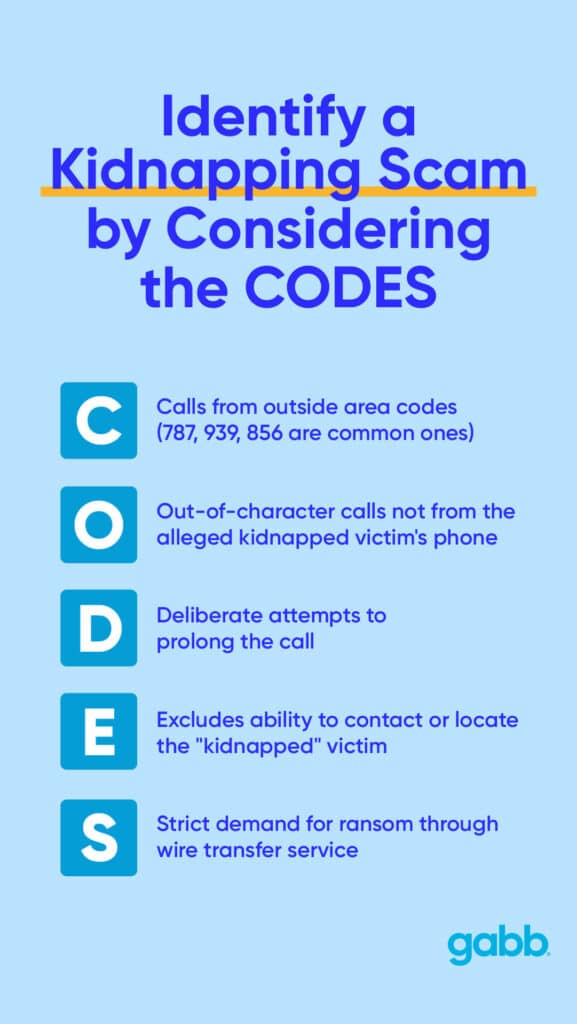Artificial intelligence (AI) is a testament to human ingenuity. From automating tasks to deciphering complex patterns, AI has revolutionized industries and enriched lives across the globe. It’s capable of accomplishing feats once deemed unimaginable.
Despite its awe-inspiring capabilities and incredible potential, AI can also be used to create big problems. One of these problems is the role AI has played in helping the growth of virtual kidnappings.
So what is a virtual kidnapping? How does AI play into it? Read on to learn more about this scheme, and how you can help keep your family safe from it.
What is an AI Kidnapping Scam?
An AI Kidnapping Scam (sometimes referred to as virtual kidnapping) is a type of scam where perpetrators use artificial intelligence, usually through automated phone calls or text messages, to trick people into believing a loved one has been kidnapped or is in danger.
These scams often exploit people’s emotions and fear, demanding ransom money or personal information in exchange for the supposed release or safety of the victim.
The scammer may use voice synthesis technology to mimic the voice of the alleged victim, or deepfakes to make individuals appear to engage in actions they never actually did. AI has blurred the line between truth and fiction with alarming realism.
Although a child is never actually taken in these schemes, it can still be highly distressing and traumatic, both mentally and financially.
With only three seconds of a sample audio, cybercriminals can clone anyone’s voice using AI.
—McAfee
AI Kidnapping in the News
In January of 2023, Jennifer DeStefano received a phone call from an unknown number. She considered not answering, but knowing her 15-year-old daughter, Brianna, was away on a ski trip, DeStefano answered fearing it could be a medical emergency.
DeStefano was met with Brianna crying and sobbing on the other line. The voice was undeniably her. A man quickly got on the phone and said he had Brianna and threatened to hurt her unless DeStefano paid a $1 million ransom. When DeStefano said she didn’t have that much money, the ransom was dropped to $50,000.
Helpful strangers around DeStefano called 911 while she stayed on the line with the “kidnapper.” Within a few minutes, DeStefano’s other daughter was able to locate Brianna, who was safely with her dad.
Another notable story occurred in January 2024 when a Chinese exchange student, Kai Zhuang, was found safely hiding in a tent in Utah. Zhuang had been convinced to hide by scammers who then used his disappearance to scam the family out of $80,000 for the safe return of Kai.
How to Identify AI Kidnapping Scams
With the help of AI programs, scams can look and sound real. The FBI has a few tips to help identify if the call is a scam.
Keep in mind that scam phone calls usually originate from an outside area code. It’s best not to answer unknown numbers. If a child is really taken, the kidnapper would likely use the child’s device to contact a family member. If the kidnapper is calling from a different device, that may be a clue that it’s a scam.

Virtual kidnappers are aggressive, talk fast, and try to keep the listener on the line to deter them from trying to contact the victim or getting help. They also won’t let the parent have a conversation with the child, which is another red flag pointing to a scam.
The scammers often demand ransoms through wire transfers. Wire transfers typically can’t be reversed, so once it’s gone, it’s gone for good.
What Should You Do?
If you’re ever the target of an AI kidnapping scam, there are a few things you can do. It’s a scary situation to be in, but try to stay calm and keep the following in mind.
In most situations, it’s best to hang up immediately. If you do choose to interact, avoid mentioning your child’s name. Oftentimes, the “kidnapper” doesn’t know their name, so calling it out gives the scammer additional information that will make their threat seem more real.
The “kidnapper” will try to rush the conversation, preying on your desperation. Slow it down and prolong it as much as possible, giving you time to get help from those around you, or trying to contact your child.
You can stall for time by reiterating the caller’s demands, telling them you are writing down the demand, or that you need time to get the ransom money transferred.

With so much of our information online, including on social media, the perpetrators may know personal details about your family. You can outsmart them by having a family safe word that only your family knows, and asking that your child reveal it over the phone so you can verify it’s really them.
Ask to speak directly to your child, and inquire about their well-being. You can also ask that your child call you back from their own device for proof.
Never agree to pay a ransom, whether via wire transfer, in person, or other means. Meeting in person can be incredibly dangerous.
Call the FBI (1-800-CALL-FBI) or your local law enforcement immediately. This is essential for stopping the perpetrators, protecting others, and seeking justice.
If you were scammed out of money, don’t be embarrassed to get help, it happens. According to the FBI, the average family in the U.S. loses $11,000 in each fake-kidnapping scam.
Prevention is key
Avoid becoming a target to scams by having private accounts online. This includes everyone in the family — parents and children.
Talk to your kids about what they post online. Remember that the more information shared online, the more content a scammer will have. For younger children just learning to communicate digitally, consider devices designed for kid safety that prevent contact with unknown people.
Stay up to date on current scams and other safe tech stories by reading the news often. Education is the best way to stay informed and prepared.
Did you know about AI kidnapping scams before reading this article? Do you have any other questions we may have missed? Leave your comments below.









Success!
Your comment has been submitted for review! We will notify you when it has been approved and posted!
Thank you!